Ccrn respiratory test - Study guides, Class notes & Summaries
Looking for the best study guides, study notes and summaries about Ccrn respiratory test? On this page you'll find 178 study documents about Ccrn respiratory test.
Page 3 out of 178 results
Sort by
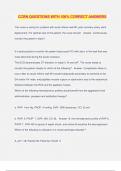
-
CCRN QUESTIONS WITH 100% CORRECT ANSWERS
- Exam (elaborations) • 35 pages • 2024
- Available in package deal
-
- $12.49
- + learn more
CCRN QUESTIONS WITH 100% CORRECT ANSWERS The nurse is caring for a patient with acute inferior wall MI, post-coronary artery stent deployment, For optimal care of the patient, the nurse should: - Answer- Continuously monitor the patient in lead II It is best practice to monitor the patient status post PCI with stent, in the lead that was most abnormal during the acute occlusion. The ECG demonstrates ST elevation in leads II, III and aVF. The nurse needs to monitor the patient closely for ...
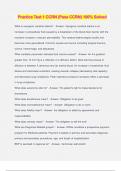
-
Practice Test 1 CCRN (Pass CCRN) 100% Solved
- Exam (elaborations) • 19 pages • 2024
- Available in package deal
-
- $12.49
- + learn more
Practice Test 1 CCRN (Pass CCRN) 100% Solved What is vasogenic cerebral edema? - Answer- Vasogenic cerebral edema is an increase in extracellular fluid caused by a breakdown of the blood-brain barrier with the resultant increase in vascular permeability. This cerebral edema begins locally and becomes more generalized. Common causes are trauma (including surgical trauma), tumors, hemorrhage, and abscesses What ventilator parameter indicates fluid volume excess? - Answer- An A:a gradient gr...
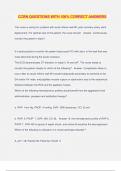
-
CCRN QUESTIONS WITH 100% CORRECT ANSWERS
- Exam (elaborations) • 35 pages • 2024
- Available in package deal
-
- $13.49
- + learn more
CCRN QUESTIONS WITH 100% CORRECT ANSWERS The nurse is caring for a patient with acute inferior wall MI, post-coronary artery stent deployment, For optimal care of the patient, the nurse should: - Answer- Continuously monitor the patient in lead II It is best practice to monitor the patient status post PCI with stent, in the lead that was most abnormal during the acute occlusion. The ECG demonstrates ST elevation in leads II, III and aVF. The nurse needs to monitor the patient closely for ...
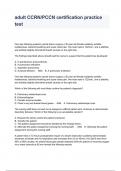
-
adult CCRN/PCCN certification practice test Questions And Answers
- Exam (elaborations) • 12 pages • 2024
-
- $10.99
- + learn more
adult CCRN/PCCN certification practice test Questions And Answers One day following posterior spinal fusion surgery a 35 year old female suddenly exhibits restlessness, labored breathing and acute chest pain. Her heart rate is 122/min., she is afebrile, and exhibits slightly diminished breath sounds on the right side. The findings described above should lead the nurse to suspect that the patient has developed: A. A spontaneous pneumothorax B. A pulmonary embolism C. Aspiration pneumo...
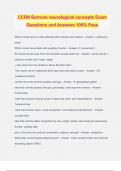
-
CCRN Barrons neurological concepts Exam Questions and Answers 100% Pass
- Exam (elaborations) • 15 pages • 2024
- Available in package deal
-
- $12.49
- + learn more
CCRN Barrons neurological concepts Exam Questions and Answers 100% Pass Which cranial nerve is often affected with a basilar skull fracture - Answer- I (olfactory)- smell Which cranial nerve deals with pupillary function - Answer- III (oculomotor) All cranial nerves arise from the brainstem except which two - Answer- cranial nerves I (olfactory-smell) and II (optic- sight) + they arise from the cerebrum above the brain stem This cranial nerve is tested by doll's eyes and cold caloric ex...
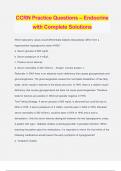
-
CCRN Practice Questions – Endocrine with Complete Solutions
- Exam (elaborations) • 29 pages • 2024
- Available in package deal
-
- $12.49
- + learn more
CCRN Practice Questions – Endocrine with Complete Solutions Which laboratory values would differentiate diabetic ketoacidosis (DKA) from a hyperosmolar hyperglycemic state (HHS)? a. Serum glucose of 600 mg/dL b. Serum potassium of 4 mEq/L c. Positive serum ketones d. Serum osmolality of 320 mOsm/L - Answer- Correct answer: c Rationale: In DKA there is an absolute insulin deficiency that causes glycogenolysis and gluconeogenesis. The gluconeogenesis causes the incomplete breakdown of f...
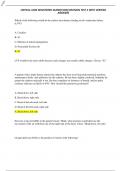
-
CRITICAL CARE REGISTERED NURSE(CCRN) REVISION TEST 2 WITH VERIFIED ANSWERS
- Exam (elaborations) • 70 pages • 2024
-
Available in package deal
-
- $11.00
- + learn more
Which of the following would be the earliest auscultatory finding in left ventricular failure (LVF)? A. Crackles B. S3 C. Murmur of mitral regurgitation D. Pericardial friction rub B. S3 LVF would be the most subtle because early changes are usually subtle changes. Choose "S3." A patient with a triple-lumen subclavian catheter has been receiving total parenteral nutrition, maintenance fluids, and antibiotics by the catheter. He has been slightly confused. Suddenly he grasps the catheter ...
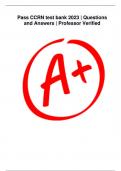
-
Pass CCRN test bank 2023 | Questions and Answers | Professor Verified
- Exam (elaborations) • 48 pages • 2023
-
- $21.49
- + learn more
Pass CCRN test bank 2023 | Questions and Answers | Professor Verified Which of the following would be the earliest auscultatory finding in left ventricular failure (LVF)? A. Crackles B. S3 C. Murmur of mitral regurgitation D. Pericardial friction rub ------Correct Answer------B. S3 LVF would be the most subtle because early changes are usually subtle changes. Choose "S3." A patient with a triple-lumen subclavian catheter has been receiving total parenteral nutrition, maintenance flui...
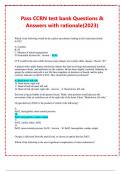
-
Pass CCRN test bank Questions & Answers with rationale(2023)
- Exam (elaborations) • 45 pages • 2023
-
- $16.49
- + learn more
Pass CCRN test bank Questions & Answers with rationale(2023) Which of the following would be the earliest auscultators finding in left ventricular failure (LVF)? A. Crackles B. S3 C. Murmur of mitral regurgitation D. Pericardial friction rub - Answer - B. S3 LVF would be the most subtle because early changes are usually subtle changes. Choose "S3." A patient with a triple-lumen subclavian catheter has been receiving total parenteral nutrition, maintenance fluids, and antibiot...
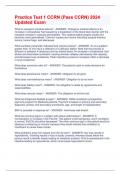
-
Practice Test 1 CCRN (Pass CCRN) 2024 Updated Exam
- Exam (elaborations) • 12 pages • 2024
-
Available in package deal
-
- $10.49
- + learn more
Practice Test 1 CCRN (Pass CCRN) 2024 Updated Exam What is vasogenic cerebral edema? - ANSWER- Vasogenic cerebral edema is an increase in extracellular fluid caused by a breakdown of the blood-brain barrier with the resultant increase in vascular permeability. This cerebral edema begins locally and becomes more generalized. Common causes are trauma (including surgical trauma), tumors, hemorrhage, and abscesses What ventilator parameter indicates fluid volume excess? - ANSWER- An A:a gradie...

Did you know that on average a seller on Stuvia earns $82 per month selling study resources? Hmm, hint, hint. Discover all about earning on Stuvia


